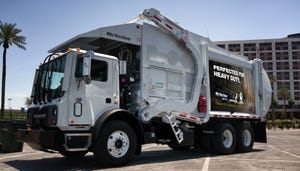LEGISLATION: Congress Plans To Make Fresh Start On CERCLA
April 1, 1995
Republicans and Democrats a-gree that the Comprehensive Envi-ronmental Response, Compensa-tion and Liability Act (CERCLA) needs change. However, a major re-write of the law is not likely to happen in 1995.
Attempts to reform CERCLA, as well as other major environmental legislation, failed in the Democrat-controlled 103rd Congress. If the Democrats had retained control of the House and Senate, last term's legislation probably would have sparked new bills in this Congress. Indeed, when the 104th Congress convened, Rep. John D. Dingell (D-Mich.), senior minority member of the House Commerce Committee, promptly introduced a Superfund reform bill that closely resembled the one that died in the final hours of the 1994 session.
However, Republican lawmakers including Rep. Thomas J. Bliley (R-Va.), chair of the Commerce Com-mittee, have promised to make a fresh start in reviewing Superfund. Thus, with virtually no chance of resurrecting last year's compromise between industry and environmental groups (which never reached the floor of either chamber), this session's debate promises to be e-ven stormier than what transpired last term.
The tax on the oil and chemical industries will expire this year. The tax helps pay for the cleanup of contaminated sites where the guilty parties are unknown or no longer in business. As a result, Congress will be forced to act. But no consensus exists on how to fix a program that is widely considered to be badly conceived.
Retroactive liability, a central feature of the existing law, faces considerable opposition. Sen. Rob-ert Smith (R-N.H.) and Rep. Mi-chael G. Oxley (R-Ohio), who chair the key subcommittees that will ex-amine any reform bills, are outspoken opponents of retroactive liability. Moreover, they want to change the law fundamentally by limiting the number of contaminated sites that are priorities for federal clean-up; by making states responsible for cleanups and giving them the authority to loosen cleanup standards; and by creating tax incentives for voluntary cleanups by business and industry.
"Everything is on the table," said Sen. Smith. "As you can see, some of these things are exciting. They are innovative, new, different, controversial and confrontational to the current system. But the current system is not working."
During the 103rd Congress, the administration opposed eliminating retroactive liability but representatives of the insurance industry be-lieve that President Clinton probably would sign a Superfund reform bill with such a provision. Indeed, the President acknowledged the need to revamp the Superfund program in his State of the Union ad-dress.
Aside from the proposal's obvious supporters - insurers and business - civil rights and community groups, as well as a major environmental organization, also are pressing to eliminate retroactive liability.
Last year's compromise measure would have imposed a new tax on insurance premiums to help support an increased federal contribution toward cleaning up old sites. The compromise also would have discouraged litigation and promoted faster cleanups. Any new legislation will retain such goals, ac-cording to Smith and Oxley. However, the lawmakers say they are not interested in reform measures that create new federal taxes.
As they see it, current taxes and corporate payments would sufficiently fund most site cleanups as long as the standards were more flexible and if states and the private sector were encouraged to act efficiently.
"If we do our job right this year, the product we come up with will be totally alien to what we now have," Rep. Oxley told a meeting of insurers. The congressman also noted that the risk assessment bill (H.R. 9) was likely to pass and that it could "have an enormous impact on the costs of programs like Su-perfund."
In related news, legislative activity under RCRA is not expected un-til after Labor Day, according to Congressional sources.
Several members of Congress want to re-introduce legislation to authorize municipal waste flow control authority, as well as a bill on interstate waste transportation. However, the compromise on both issues, which was achieved during the final days of the 103rd Con-gress, is unlikely to be the starting point for debate.
Rep. Christopher Smith (R-N.J.) introduced H.R. 24 on opening day of the 104th Congress. The bill re-vives the flow control language that passed the House, but died in the Senate last session. Some members of last year's pro-local government coalition, which favored moderate flow control authority, do not want to debate last year's compromise.
Meanwhile, even if an interstate waste transportation bill is introduced in this session, its chances for passage may be slim. In short, flow control and interstate waste issues simply are not a high priority in a Congress that is now preoccupied with the Contract with America.
About the Author(s)
You May Also Like




